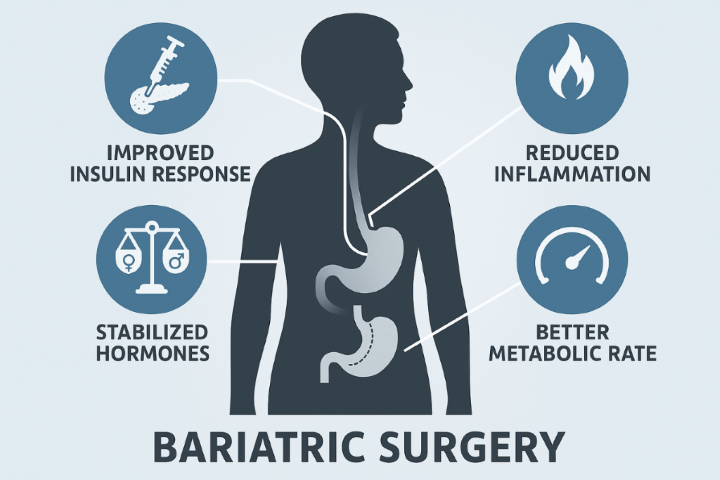
The Metabolic Benefits of Bariatric Surgery: Beyond Weight Loss
Share
Obesity has become a global epidemic, with millions of individuals struggling to manage their weight and related health complications. While traditional methods like dieting and exercise may work for some, they often fall short for individuals with severe obesity or underlying metabolic disorders. In recent years, bariatric surgery has emerged as a transformative intervention—not only enabling sustained weight loss but also delivering profound metabolic improvements.
Understanding Metabolic Health
Metabolism encompasses the body’s biochemical processes that convert food into energy and regulate physiological functions. When disrupted, these processes can lead to metabolic syndrome, a cluster of conditions including central obesity, insulin resistance, dyslipidemia, and hypertension—major risk factors for type 2 diabetes, cardiovascular disease, and certain cancers (National Heart, Lung, and Blood Institute).
Traditional weight loss methods often struggle to correct these metabolic imbalances, especially in individuals with chronic obesity. Bariatric surgery, however, influences these pathways directly and rapidly.
Metabolic Shifts After Bariatric Surgery
Bariatric procedures such as gastric bypass, sleeve gastrectomy, and gastric banding induce anatomical and physiological changes that drive rapid weight loss. More importantly, they bring about profound changes in metabolic function, often preceding any significant weight loss.
Hormonal Adaptations
Bariatric surgery alters gastrointestinal hormone profiles. Enhanced secretion of hormones like GLP-1 (glucagon-like peptide-1) and PYY (peptide YY) promotes satiety, regulates glucose homeostasis, and improves insulin sensitivity (Holst et al., 2018, Nature Reviews Endocrinology).
Insulin Sensitivity
Improved insulin sensitivity is a hallmark metabolic outcome. In fact, many patients see immediate improvements in blood glucose regulation, often within days post-surgery, independent of weight loss (Schauer et al., 2012, NEJM).
Glucose Regulation
Surgical procedures like gastric bypass significantly enhance beta-cell function and hepatic insulin sensitivity, thereby transforming glucose metabolism and reducing the need for diabetes medications (Mingrone et al., 2012, NEJM).
Broader Health Benefits Beyond Weight Loss
Cardiovascular Outcomes
Studies show marked improvements in blood pressure, LDL cholesterol, triglycerides, and other markers of cardiovascular risk following bariatric surgery (Adams et al., 2007, NEJM).
Diabetes Remission
Bariatric surgery is a powerful tool for type 2 diabetes management. Up to 78% of patients experience remission of diabetes, with significant improvements in insulin action and pancreatic function (Buchwald et al., 2009, American Journal of Medicine).
Reduced Inflammation
Post-surgical reductions in systemic inflammation are evidenced by decreased levels of C-reactive protein (CRP) and IL-6, markers commonly elevated in obesity and metabolic syndrome (Monteiro et al., 2019, Obesity Surgery).
Long-Term Metabolic Adaptation
Gut Microbiome
Bariatric surgery modifies gut microbiota composition and function, which may further enhance energy regulation, immune function, and nutrient metabolism (Furet et al., 2010, Diabetes and Metabolism).
Hormonal Recalibration
Surgery impacts levels of ghrelin and leptin, recalibrating hunger and satiety signaling and contributing to long-term weight regulation (Cummings et al., 2004, NEJM).
Sustained Benefits
Most patients maintain metabolic improvements over time, provided they receive adequate follow-up and adhere to post-surgical care protocols. This includes ongoing support for nutrition, lifestyle changes, and medical monitoring.
Selecting the Right Candidates
Bariatric surgery is generally recommended for:
- Individuals with BMI ≥ 40
- Those with BMI ≥ 35 and one or more obesity-related comorbidities
A multidisciplinary preoperative evaluation is essential to assess suitability, readiness for lifestyle changes, and to manage expectations.
Post-Surgical Metabolic Optimization
Nutrition
Lifelong nutritional support ensures adequate intake of protein, vitamins, and minerals. Deficiencies—especially in B12, iron, calcium, and vitamin D—must be prevented or corrected.
Physical Activity
Regular exercise supports muscle preservation, metabolic rate, and insulin sensitivity. Combining aerobic activity and resistance training is ideal.
Monitoring
Frequent follow-ups help detect nutrient deficiencies, hormonal shifts, and metabolic rebound. Adjustments in supplementation, medications, and behavioral therapy may be necessary.
Conclusion
Bariatric surgery offers far more than weight loss—it facilitates metabolic restoration. From hormonal balance and improved insulin sensitivity to long-term cardiovascular and glycemic control, the surgery represents a cornerstone in managing obesity and its metabolic complications.
With robust evidence supporting its benefits, and proper patient selection and follow-up care, bariatric surgery can help patients reclaim metabolic health and enhance quality of life.
Medical Disclaimer
This content is for informational purposes only and does not constitute medical advice. Always consult with a qualified healthcare provider before making any medical decisions or starting new treatments.
